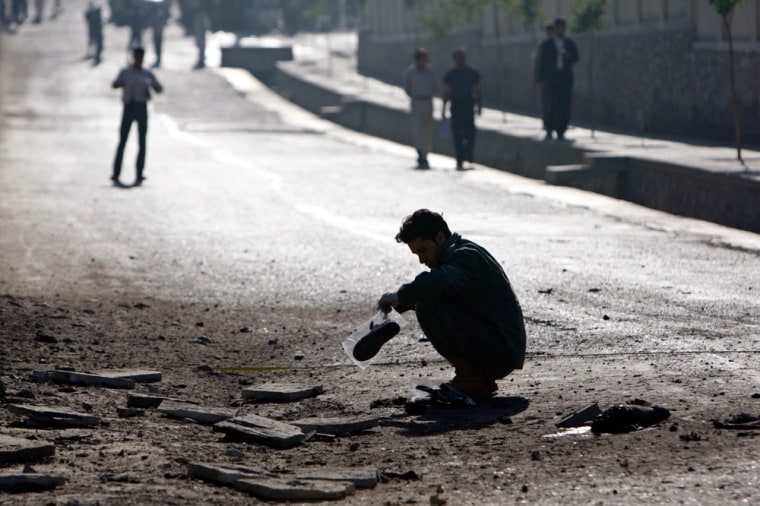A suicide bomber blew himself up Tuesday in the Afghan capital, wounding three civilians, while clashes in the country's west prompted U.S.-led forces to use airstrikes on Taliban militants, officials said.
The violence is the latest sign of Afghanistan's deepening troubles as it battles a resurgent Taliban nearly seven years after the U.S.-led invasion ousted the militant movement from power.
In Kabul, the bomber struck next to the walls of the city's historic Babur Gardens, a popular public park, wounding three civilians, said police official Ali Shah Paktiawal. The victims were riding on a minibus at the time of the explosion, Paktiawal said.
The Taliban claimed responsibility.
Regional police spokesman Rauf Ahmadi said coalition and Afghan troops called in the airstrikes Tuesday on Taliban militants in the Bala Buluk district of western Farah province. The joint force has been battling militants there since Monday afternoon, he said.
Clashes in Bala Buluk
Two police officers died and three were wounded, while some 25 militants were wounded or killed, he said.
1st Lt. Nathan Perry, a coalition spokesman, declined to provide any details on the ongoing clash in Bala Buluk because of operational security reasons.
However, he confirmed that a suicide bomber on a bike had aimed for a coalition patrol in Bakwa district in Farah, while a roadside bomb hit a separate coalition patrol in neighboring Gulistan district in Farah on Monday. Militants also fired small arms and rocket-propelled grenades to attack a coalition convoy on Tuesday, also in Bala Baluk, Perry said.
Perry would not say if any troops have been wounded but said none were killed.
In a news conference Tuesday, Maj. Gen. Robert W. Cone, commander of a U.S.-led combined security training force, addressed the recent rise in violence.
Speaking to reporters in Washington by video from Kabul, Cone confirmed there has been an increase in attacks, but at the same time, he said, "the Afghan military has stepped up to this in a way that we haven't seen before."
Cone said that 2,300 more police trainers were needed. Fifteen nations are contributing to the training force, he said, helping to secure the rule of law at the provincial level.
Insurgency-related violence
Across the country in eastern Afghanistan, gunmen early Tuesday killed the spokesman for the governor of Paktika province, Ghamai Khan Mohammadyar, and wounded his wife, his brother and his mother.
Hashmatullah Yusufi, the spokesman for the governor in neighboring Paktia province, confirmed the incident. Mohammadyar lived in Paktia but worked in Paktika, Yusufi said.
On Monday night, militants killed four brothers — all policemen — and kidnapped their father from Qarabagh district in central Ghazni province, said a statement from the Ministry of Interior. Police are searching for the father.
More than 2,500 people have died in insurgency-related violence this year in Afghanistan, according to an Associated Press tally of official figures.
The Taliban insurgency is primarily concentrated in the south and east, but significant fighting is occurring in the west and central parts of the country.
Leader killed
In other developments in Afghanistan, a senior Taliban commander in the south surrendered to Pakistani authorities and British forces killed another leader, dealing a "shattering blow" to the militant group's leadership, the British army said on Tuesday.
Mullah Rahim, the top commander for southern Helmand province, gave himself up after British forces had killed two other Taliban leaders in little over three weeks.
Hours after his surrender, another senior Taliban commander, Abdul Rasaq, also known as "Mullah Sheikh," was killed in a British missile strike 9 miles north of the town of Musa Qala in Helmand on Monday morning, the British army said in a statement. Three other insurgents also died.
Rasaq headed Taliban actions around Musa Qala and was active in the insurgency for a number of years, it said.
"The Taliban's senior leadership structure has suffered a shattering blow," British army spokesman Lieutenant Colonel Robin Matthews said in the statement.
